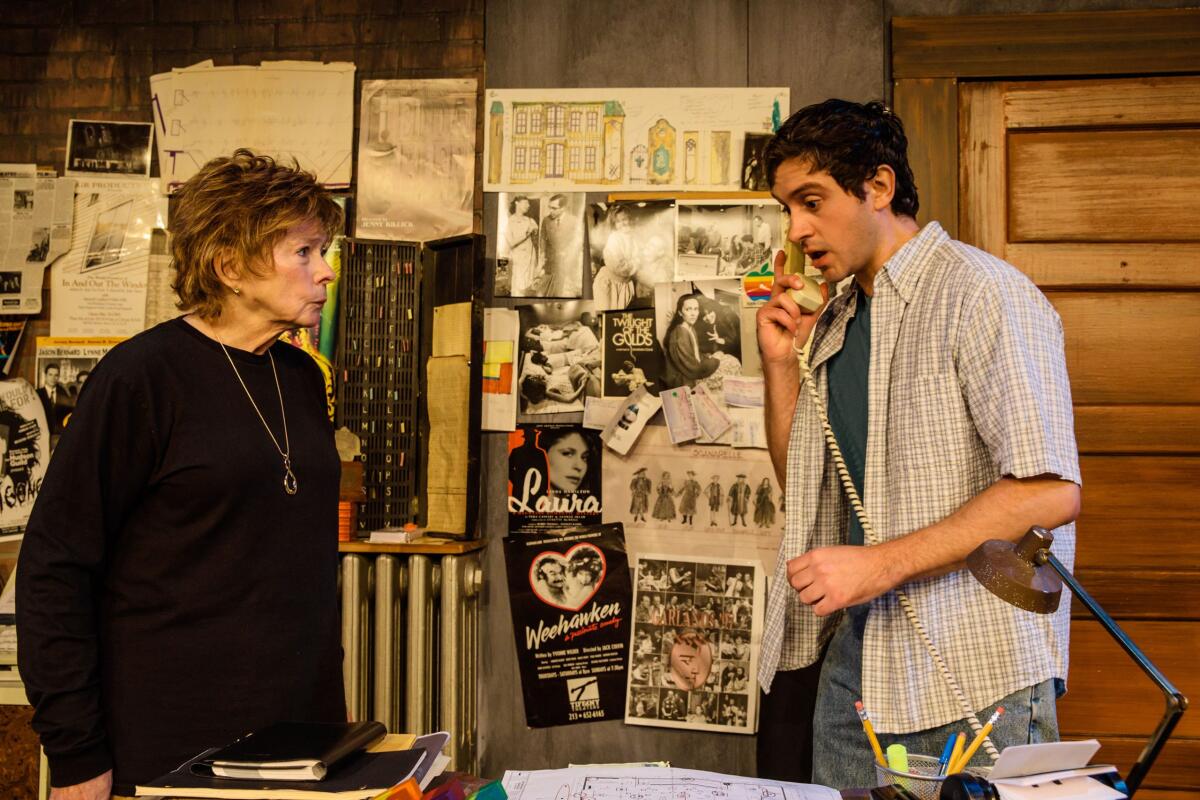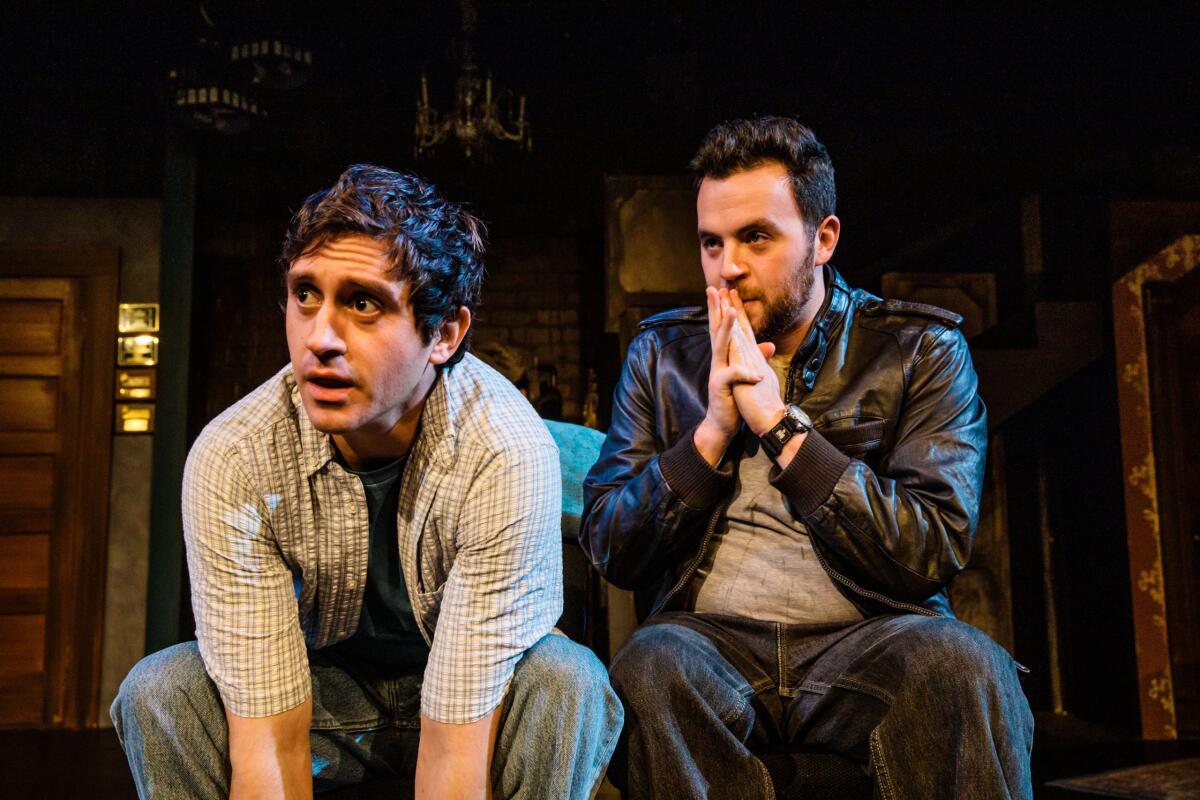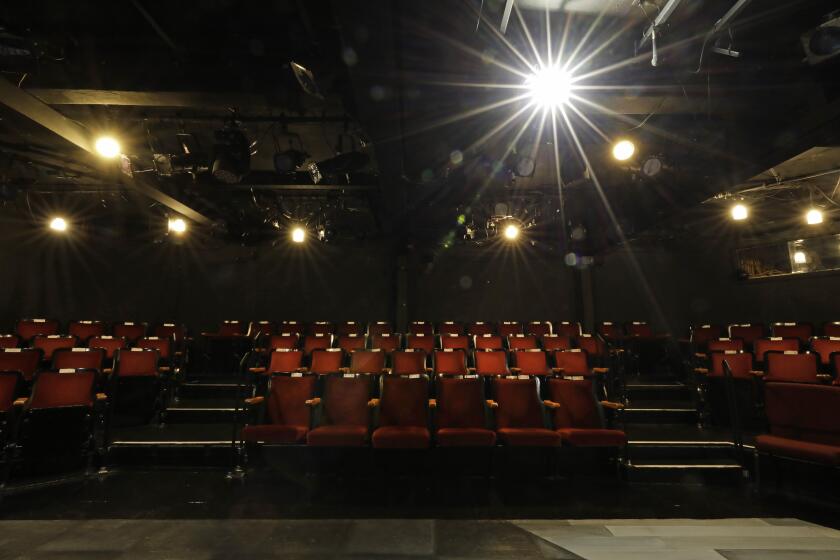The engrossing ‘Little Theatre’ spills the tea on L.A.’s 99-seat theater scene

- Share via
“Little Theatre,” an engrossing autobiographical play receiving its world premiere in another well-wrought Rogue Machine production at the Matrix Theatre, is Justin Tanner’s self-portrait of a playwright as a confused young man struggling to discover his talent and hold onto his sanity in 1990s Los Angeles.
James (Zachary Grant) is Tanner’s surrogate, a character who regularly steps out of the drama to narrate his own story. Traumatized by his upbringing and grappling with a serious substance abuse problem that has resulted in three DUIs before the age of 25, he arrives at the pseudonymous El Centro Theatre in Hollywood to work off his required community service in the box office and emerges an established, if still highly unstable, writer.
A comedy à clef, “Little Theatre” tells of the period when Tanner (best known for his play “Pot Mom”) became the house playwright of the Cast Theatre, located on El Centro Avenue. More crucially, the play deals with Tanner’s fraught relationship with the queen of this company, Diana Gibson, here renamed Monica and played by Jenny O’Hara with fierce harridan humor.
Monica is an abusive, sexually inappropriate, day-drinking tyrant who also happens to be a startlingly effective muse. Having glimpsed a spark of talent in James, she demands that he submit to her artistic control. Their collaboration is dysfunctional in the extreme, but it pays dividends.
Under her auspices, James starts receiving favorable reviews in the L.A. Times; Sunday Calendar features discuss his work and nominations for local theater awards roll in. He becomes popular and prolific. But this success only feeds Monica’s bad behavior, which is neatly summed up in her motto: “We like chaos — it’s good for creativity.”

Her lashing out requires a captive audience. On hand is her managing director and in-house set designer, Danny (Ryan Brophy), who is accustomed to her twisted antics. He spars gamely with her — and has the scars to prove it.
Monica goes for the jugular, among other vulnerable body parts. She has the alcoholic’s knack of zeroing in on another person’s shame. She taunts Danny (based on Andy Daley, who like Tanner was mentored by Gibson) about his failures in playwriting and mercilessly attacks his set design choices.
“Little rich boy with this much talent,” she says with the vindictive glee of a schoolyard bully. “Wait, look at the small distance between my fingers.”
The play builds to a blowup that could have reasonably happened at the end of the first act, which ends with its own mini explosion. Furious with James for tampering with his own work behind her back, Monica greets the incoming audience for his new play with a display so “nut-bag loon” that not even James can fail to be impressed.
What changes in the second half is James’ stature. He earns a lucrative TV gig through his theater work. Monica gloms onto this success, taking all the credit for it and wanting a significant piece of the action. Eventually, there’s a revolt at El Centro, culminating in a theatrical coup.
The economic devastation of the pandemic is taking a profound toll on L.A.’s small theaters. Camaraderie, and action, are easing the pain.
Why does James put up with her for so long? Partly because he’s become dependent on her guidance, not sure how good he is on his own. And partly because she’s become a replacement for his mother, with whom he has an equally sick relationship.
Monica is aware that, as she says, she’s become a “mommy proxy” for both James and Danny. She exploits this psychological vulnerability to avoid paying James and to get Danny to do all the theater’s grunt work. Drugs and booze numb the characters to the damage of their interlocking pathologies, but nothing lasts forever.
“Little Theatre” is convincing in its aberrant detail, but the work hasn’t fully made the leap from stage memoir to autonomous drama. A clear dramatic throughline has difficulty emerging from the mound of memories. Plot and character at times seem to be in the service of history rather than of art. Sharper theatrical delineation might have given the play greater resonance.
But as a slice of L.A. cultural history, “Little Theatre” is invaluable. The play, under the clear direction of Lisa James, captures both the era and the subculture. The preoccupation of the characters with print media indicates the distance from the present. Anxious references to former L.A. Times theater critics abound. And when the theater’s dirty laundry is aired in an L.A. Weekly cover story (“The Prisoner of El Centro Avenue,” written by the one and only Steven Mikulan), the end is near.
I wasn’t in Los Angeles when the Cast Theatre was in operation, but Tanner’s play evoked for me a vivid sense of the period. As did John Iacovelli’s set, which on one end lays out the theater’s administrative office in all its shabby clutter and on the other the domestic lair of Monica, whose true home is her shoestring nonprofit venue.
The play deftly reveals the double reality of the 99-seat theater scene. This world unto its own offers an accessible playground for strays with boisterous imagination but provides no economic stability, even when critical success is achieved.
Monica, Danny and James are toiling in the shadow of the entertainment industry — relative paupers who can’t help wondering if they’ll ever be invited to the nearby banquet. They justify their unremunerative paths by an idea of art as ultimate redemption. No theatrical hit is going to fill up the holes inside them, never mind their bank accounts. But their scrappy work creates something of value that wasn’t there before.
Brophy is so natural he seems to be living in Danny’s slightly smelly clothes. Don’t let the gruff, straight, sloppy normality fool you: Danny is perhaps the most sensitive oddball in the room.
Grant honors both James’ interior brokenness and his resilience. The protagonist’s recollections are hardly neutral. But a somber note of regret in Grant’s portrayal suggests that the story is more emotionally complicated than it seems and that there’s plenty of guilt to go around.
As Monica, the intrepidly impish O’Hara is an almost sacred monster. The role is large and lines were occasionally fumbled at the opening-night performance. But her performance allows us to see how a toxic personality can sometimes be, for a limited time and under rarefied circumstances, life-enhancing.
How close Monica is to her real-life model is for people who knew Gibson to judge. My only experience of Gibson, who died in 2014, was through her idiosyncratic house management style at the Fountain Theatre, where she chattily escorted theatergoers to their seats in a manner that was the opposite of efficient.
Thankfully, L.A.’s 99-seat theaters still provide a refuge for eccentric theater types, whose careers have often been launched from their welcoming stages. It is heartening that Rogue Machine, which this year has had the strongest theater season of any other local company, large or small, remains a home for an artistic survivor like Tanner.
“Little Theatre” may not be perfect, but perfection isn’t the point. The truth embodied in this play is of the kind that you could never experience anywhere outside of a tiny theatrical venue, where small stakes allow for surprising confidences.
'Little Theatre'
Where: Rogue Machine at Matrix Theatre, 7657 Melrose Ave., L.A.
When: 8 p.m. Wednesdays-Saturdays, 3 p.m. Sundays. (Check for exceptions.) Ends Jan. 8
Tickets: Starts at $25
Contact: (855) 585-5185 or roguemachinetheatre.net
Running time: 2 hours, including one intermission.
More to Read
The biggest entertainment stories
Get our big stories about Hollywood, film, television, music, arts, culture and more right in your inbox as soon as they publish.
You may occasionally receive promotional content from the Los Angeles Times.












